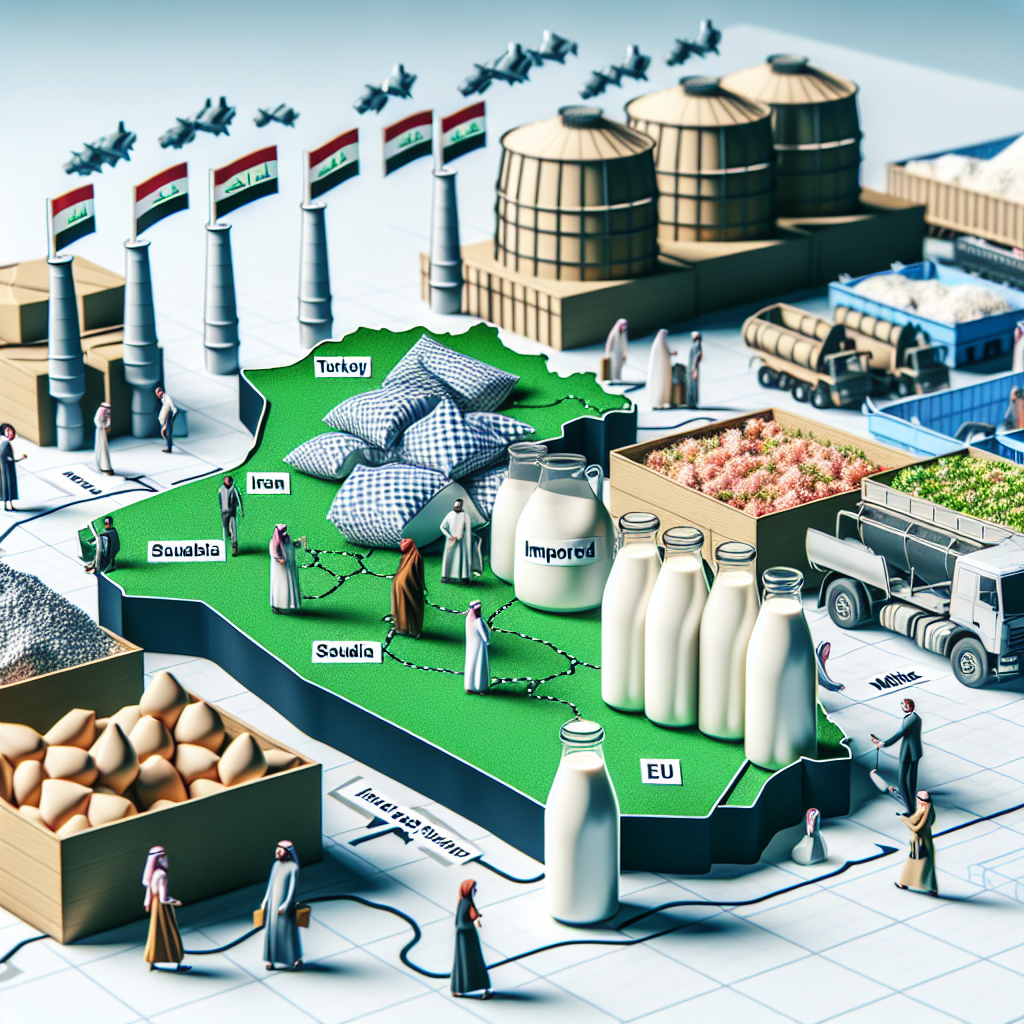“Insider’s Guide to Milk Imports in Iraq: Trends & Strategies”

Dynamic Import and Export Analysis Report: Import Milk to Iraq
Objective
The objective is to produce a detailed analytical report on the import and export activities of milk within Iraq, utilizing advanced data integration for comprehensive market insights.
Executive Summary
This report provides an in-depth analysis of the import and export conditions for milk in Iraq. The analysis includes production capacities, compliance with quality standards, competitive pricing, market demand, key target markets, and prevailing trade trends. The aim is to furnish stakeholders with actionable insights to enhance decision-making around the import and export activities of milk in Iraq.
Detailed Analysis
Section A: Import Analysis for Iraq
Main Imported Products:
- Milk and cream
- Milk powder
- Butter and dairy spreads
- Cheese and curd
Reasons for Importing:
- Insufficient local production to meet demand
- Preference for high-quality imported products
- Competitive pricing of imported goods
Import Values in USD:
In 2022, Iraq imported dairy products worth approximately $500 million.
Supplier Countries:
- Turkey
- Iran
- Saudi Arabia
- European Union (especially Germany and Netherlands)
Section B: Export Analysis for Iraq
Main Exported Products:
- Dates and date products
- Petroleum and crude oil
- Cement and construction materials
- Agricultural products (excluding dairy)
Reasons for Exporting:
- High demand for raw materials and agricultural products from Iraq
- Abundant natural resources
Export Values in USD:
Data not applicable for milk since Iraq is not a significant exporter of dairy products.
Primary Target Markets:
- Neighboring Middle Eastern countries
- European Union
- Asia
Market Dynamics and Trends
Current Trends:
- Increasing demand for dairy products within Iraq due to population growth and rising incomes.
- Developments in local dairy farming techniques aiming at improving milk production.
- Emerging health trends boosting demand for high-quality milk and dairy products.
Graphical Representations:
Milk Import Trend Analysis (2020-2022):
Top Supplier Countries for Dairy Products (2022):
Regulatory and Strategic Framework
Regulatory Environment:
- Iraq’s food safety regulations and standards must be met by imported dairy products.
- Tariff structures and import duties applicable to dairy imports.
- Compliance with international trade agreements and regulations.
Strategic Considerations:
- Efficient logistics and supply chain management to ensure timely delivery of perishable products.
- Navigating tariff impacts and utilizing trade agreements to reduce costs.
- Leveraging quality certifications to enhance market trust and penetration.
Strategic Recommendations and Conclusion
Strategic Insights:
- Enhancement of Local Production: Encourage investments in local dairy farming to reduce reliance on imports. Government incentives for modern dairy farming techniques.
- Market Penetration: Establish partnerships with leading dairy exporters for consistent supply. Utilize market research to understand consumer preferences and tailor product offerings.
- Regulatory Compliance: Stay updated with changing regulations and ensure compliance to avoid trade disruptions.
- Supply Chain Optimization: Invest in cold chain logistics to maintain the quality of imported milk products.
Conclusion: Milk remains a crucial import commodity for Iraq due to high demand and insufficient local production. Strategic partnerships, regulatory compliance, and investment in local farming can help mitigate dependency on imports and enhance the dairy sector’s overall market presence.
Translation Note
The report is provided in English as per the identified language requirement. Should the language differ, automatically translate the report into the designated language.
Usage Tips
- Use this template in automated reporting tools for real-time analysis.
- Ensure robust input parsing algorithms are employed to accurately extract and categorize data from varied text inputs.

